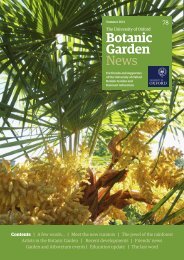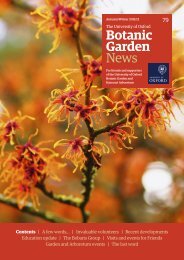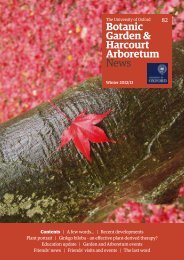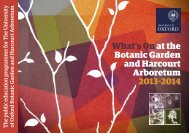2 <strong>Botanic</strong> <strong>Garden</strong> <strong>News</strong> | No. 77A few words...Timothy Walker has just celebrated the 25th anniversary <strong>of</strong>his joining the <strong>Garden</strong> staff as General Foreman. He has beenthe Horti Praefectus since 1988; the 16th person to occupythis position since 1642. In 2002 the post was renamed‘Director’ following current <strong>University</strong>employment nomenclature but the Latinsynonym remains valid.byTimothyWalkeryears <strong>of</strong> work. <strong>The</strong> World’s land area is 600times that <strong>of</strong> the UK so it would take 169million years <strong>of</strong> work by one person tobring the World up to the UK standard froma standing start. This is the equivalent <strong>of</strong>4,225,000 careers, assuming 40 years <strong>of</strong>work per person.Once the World has been catalogued,how many people are required to maintainthe inventory? Using UK figures again, wehave 2,000 field botanists, hence the Worldneeds 1,200,000 in total.<strong>The</strong>se are, <strong>of</strong> course, approximations, butthey do show that the task <strong>of</strong> monitoringbiodiversity is a huge one. <strong>The</strong>se figures arefor plants only, which are among the bestunderstood groups (together with mammalsand birds). <strong>The</strong> task facing entomology ismuch bigger.<strong>The</strong> second problem is one <strong>of</strong> method.Do we survey the World country by countryIn the past 400 yearsapproximately 7,000 botanistshave contributed to ourcurrent understanding <strong>of</strong> theBritish flora - an accumulatedtotal <strong>of</strong> 281,700 years <strong>of</strong> work.If you were asked today to compile aninventory <strong>of</strong> the World’s land plantshow would you do it? <strong>The</strong> first problemwould be one <strong>of</strong> scale: the World is avery big place, approximately 57.5 millionsquare miles or 600 times the area <strong>of</strong> theUK, and carrying out a botanical survey<strong>of</strong> it all would probably take more than alifetime. So how many lifetimes or peoplewould you need? It is reasonable to assumethat the flora <strong>of</strong> the UK is as well recordedas that <strong>of</strong> any country. If we knew how longit has taken to carry out that recording, wemight be able to calculate how long it wouldtake to record the rest <strong>of</strong> the World’s flora.Of course some countries already havecomprehensive records, but the calculationwould still be valid.<strong>The</strong> serious study <strong>of</strong> the Britishflora could be dated from 1836 with thefoundation <strong>of</strong> the <strong>Botanic</strong>al Society <strong>of</strong>London, now the <strong>Botanic</strong>al Society <strong>of</strong>the British Isles (BSBI, www.bsbi.org.uk). However it goes back to before then,perhaps to 1660 when John Ray publishedhis Flora <strong>of</strong> Cambridgeshire. <strong>The</strong>re aremany 17th century specimens in the <strong>Oxford</strong><strong>University</strong> Herbarium so we could say thatthe British flora has been studied for 400years, or the equivalent <strong>of</strong> 10 pr<strong>of</strong>essionallifetimes.Now we need to know how manypeople have been working on botanisingBritain. <strong>The</strong> Select Committee on Science& Technology cannot answer that questionaccurately (see www.publications.parliament.uk/pa/ld200708/ldselect/ldsctech/162/16206.htm) and neither can I.However, there are currently approximately100 county recorders working for the BSBIin Britain. In <strong>Oxford</strong>shire there are at leasttwenty first-class botanists in the field, soif this county is typical, there are currentlyapproximately 2,000 skilled botanists inBritain & Ireland, or one botanist for every30,000 citizens. (You may have noticedthat I have not attempted to differentiatebetween pr<strong>of</strong>essional and amateurbotanists; it is clear that the amateurs greatlyout number the pr<strong>of</strong>essionals.)If you extrapolate this back to 1600 whenthere were 4 million people living in Britain,then in the past 400 years approximately7,000 botanists have contributed to ourcurrent understanding <strong>of</strong> the British flora.That is an accumulated total <strong>of</strong> 281,700or do we organize botanists by botanicalfamily? In the former case we would endup with 195 national floras; in the latterwe would have 13,000 monographs forthe genera <strong>of</strong> flowering plants alone. <strong>The</strong>major advantages <strong>of</strong> country floras are thatcompiling them requires less travel and theyare more useful in the field. <strong>The</strong> advantage<strong>of</strong> monographs is that they take a globalview <strong>of</strong> species delimitation. In practice weneed both. In the Herbarium in <strong>Oxford</strong> thereare floras covering a wide variety <strong>of</strong> areas,ranging the whole <strong>of</strong> the USSR to Sheffieldand its surrounding region.If you do not already have a copy <strong>of</strong> yourcounty flora, I cannot recommend it highlyenough. <strong>The</strong> current flora <strong>of</strong> <strong>Oxford</strong>shireFilming for a television series on the History <strong>of</strong> Botany tookplace at the <strong>Arboretum</strong> and the <strong>Garden</strong> over the autumn andwinter. <strong>The</strong> series, which features Timothy Walker, will beshown on BBC4 in the spring.
at the<strong>University</strong> <strong>of</strong> oxford <strong>Botanic</strong> <strong>Garden</strong><strong>Botanic</strong> <strong>Garden</strong> <strong>News</strong> | No. 773<strong>The</strong> Healing Power<strong>of</strong> Plants lecture seriesbyAlisonFosterRobert Morison (1620 -1683), Scottish botanistwho, with his contemporary John Ray,elucidated and developed the systematicclassification <strong>of</strong> plants.was published in 1998, the first for over 70years. It is a classic, a benchmark againstwhich all other floras can be judged. Itincludes all land plants from liverworts t<strong>of</strong>lowering plants and there is a great deal <strong>of</strong>background information on geology, historyand ecology.When it was first published it cost £45, butyou can now get a copy for the truly bargainprice <strong>of</strong> £20.50. If you would like one pleasecontact me on timothy.walker@obg.ox.ac.uk. £10 <strong>of</strong> the cost will go towardsan appeal for a new brush wood cutter forthe Bernwood Wildlife Group, the localvolunteer group which works on BBOWT(Berks, Berks & Oxon Wildlife Trust)reserves, mainly Whitecross Green Woodnear Horton cum Studley and RushbedsWood near Ludgershall.Dr Alison Foster worked as a chemistin the pharmaceutical industry foreight years until her passion for plantsgot the better <strong>of</strong> her. She has beenworking at the <strong>Botanic</strong> <strong>Garden</strong> sinceAugust 2008, initially as a traineehorticulturalist. She is currently one<strong>of</strong> the Glasshouse horticultural teamand has planned the new medicinalplant collection at the <strong>Garden</strong>.On Monday evenings from October tomid-November last year, audiences in theDaubeny Lecture <strong>The</strong>atre at the <strong>Botanic</strong><strong>Garden</strong> were treated to a feast <strong>of</strong> plant science.<strong>The</strong> lecture series, entitled <strong>The</strong> HealingPower <strong>of</strong> Plants, brought together expertspeakers from institutions across the UK toimpress upon us the importance <strong>of</strong> plants(and soil microbes) in modern medicines.We began with an introduction to the newmedicinal plant area in the <strong>Garden</strong> byglasshouse horticulturalist Alison Foster. Sheexplained the stories behind the choice <strong>of</strong>particular plants, including how the oldesttree in the <strong>Garden</strong> – Bobart’s English YewTaxus baccata – is now <strong>of</strong> crucial importancein a modern treatment for breast and ovariancancer.“Elvis Lives!” painted on semi-solid agarmedium plates using spores <strong>of</strong> Streptomycescoelicolor (www.plosbiology.org/article/info:doi/10.1371/journal.pbio.1000510)<strong>The</strong> second speaker, Pr<strong>of</strong>essor Sir DavidHopwood from the John Innes Centre,Norwich, dug deeper into the fascinatingworld <strong>of</strong> antibiotic-producing soil microbes.the Medicinal PlantcollectionWe heard about the introduction <strong>of</strong> the firstPlants and medicines have been intrinsicallylinked for centuries. even today, when soantibiotics and about recent advances in themuch modern research is behind every newpharmaceutical drug, plants play a vital rolein drug discovery and thus medicine. Whenfield, as well as how the pigments the that <strong>University</strong> <strong>of</strong> oxford these<strong>Botanic</strong> <strong>Garden</strong> wasfounded as a physic garden we relied on plantsand other natural sources for medications. somany important drugs have been discovered inmicrobes create can be used by artists.plants since then and many others would nothave been developed without the inspirationprovided by plants. it is important for us to<strong>The</strong> following week we learnt consider that how few a plants have actually beeninvestigated for their medicinal properties. it isestimated that only 10% <strong>of</strong> the plant species onearth have been studied in this manner. if thesespoonful <strong>of</strong> sugar does indeed help theplants are not conserved for the future then wemay never know what treasures lie within them.medicine go down. Robert Nash (PhytoquestLtd) explained the hidden world <strong>of</strong> plantderivediminosugars (sugar molecules inAlison Fosterwhich the ring oxygen atom is replaced by anitrogen atom). Robert has a long-standingcollaboration with Pr<strong>of</strong>essor George Fleet(Department <strong>of</strong> Chemistry, <strong>Oxford</strong>) and wewere pleased to welcome George and hisgroup along to the talk.Pr<strong>of</strong>essor Dianna Bowles from the Centrefor Novel Agricultural Products (CNAP),York, told us the amazing story <strong>of</strong> theArtemisia Project. Artemisia annua is thesource <strong>of</strong> artemisinin, the most importantanti-malarial therapy in use today. Despitebeing treatable, malaria is responsible foralmost 1 million deaths a year. <strong>The</strong> Project,which is funded by the Bill and MelindaGates Foundation (to the tune <strong>of</strong> over £26million), aims to create improved varieties<strong>of</strong> Artemisia annua with higher artemisininyields and to deliver seeds at cost to growersin the countries most affected by malaria.<strong>The</strong> lecture series was brought to amemorable end by Pr<strong>of</strong>essor MoniqueSimmonds, Deputy Keeper <strong>of</strong> the JodrellLaboratory and Head <strong>of</strong> the SustainableUses <strong>of</strong> Plants Group, Royal <strong>Botanic</strong><strong>Garden</strong>s, Kew. Monique gave us an overview<strong>of</strong> the importance <strong>of</strong> medicinal plants assources <strong>of</strong> primary health care to peoplesaround the world, and <strong>of</strong> the issues causedby associated biodiversity loss.All the lectures were digitally recordedand are now available on-line as podcastsfrom the <strong>University</strong> <strong>of</strong> <strong>Oxford</strong> web site aswell as directly through iTunes:http://podcasts.ox.ac.uk/openspires.html, and click on Museums, Libraries andServices.the Medicinal Plant collection at the <strong>University</strong> <strong>of</strong> oxford <strong>Botanic</strong> <strong>Garden</strong>the Medicinal Plantcollectionat the<strong>University</strong> <strong>of</strong> oxford <strong>Botanic</strong> <strong>Garden</strong>A new guide to theMedicinal PlantCollection at the<strong>Botanic</strong> <strong>Garden</strong> byDr Alison Foster,available from the<strong>Botanic</strong> <strong>Garden</strong> shopor via www.oushop.com/acatalog/<strong>Oxford</strong>_<strong>Botanic</strong>_<strong>Garden</strong>.html






